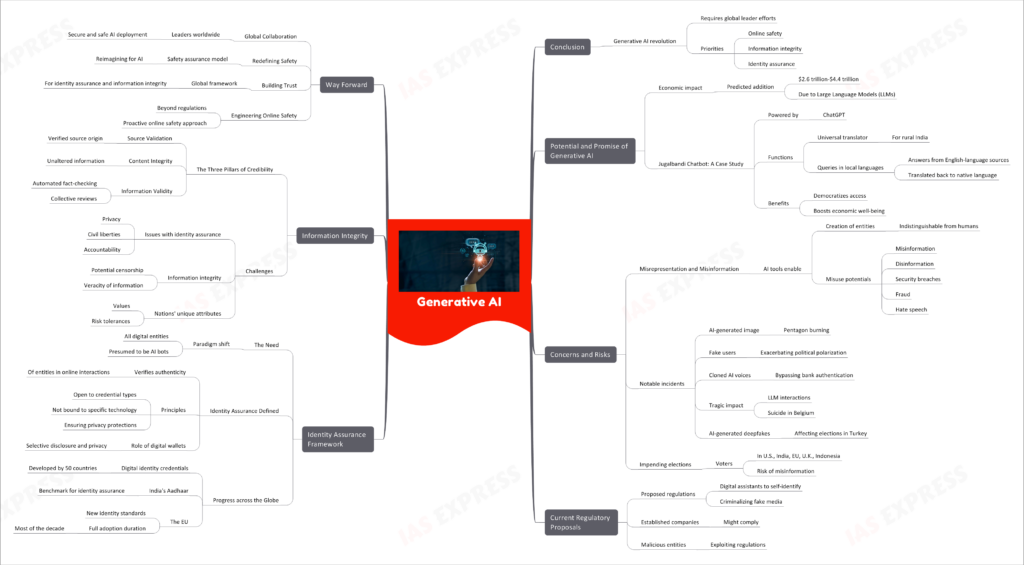Generative AI- How Can We make it Safer?

The dawn of the Generative AI revolution promises unparalleled advancements and transformations in our society. However, along with its vast potential, it presents significant challenges, especially concerning the integrity of information and the security of online identities.

This topic of “Generative AI- How Can We make it Safer?” is important from the perspective of the UPSC IAS Examination, which falls under General Studies Portion.
Potential and Promise of Generative AI
Economic Impact
- Predicted addition of $2.6 trillion-$4.4 trillion annually to the global economy due to Large Language Models (LLMs).
Jugalbandi Chatbot: A Case Study
- Powered by ChatGPT.
- Acts as a universal translator for rural India.
- Accepts queries in local languages, retrieves answers from English-language sources, and translates them back to users in their native language.
- Can democratize access to information and boost economic well-being for millions.
Concerns and Risks
Misrepresentation and Misinformation
- AI tools enable creation of entities indistinguishable from humans online (via speech, text, video).
- Potential for misuse in the form of misinformation, disinformation, security breaches, fraud, hate speech, etc.
Notable Incidents
- AI generated image of Pentagon burning disturbed U.S. equity markets.
- Fake social media users exacerbating political polarization.
- Cloned AI voices bypassing bank authentication measures.
- Tragic impact of LLM interactions leading to a suicide in Belgium.
- Recent elections in Turkey affected by AI-generated deepfakes.
Impending Elections
- Over one billion voters in the U.S., India, the EU, the U.K., and Indonesia will vote soon, heightening the risk of misinformation and election interference.
Current Regulatory Proposals
- Proposals include requiring digital assistants to self-identify and criminalizing fake media.
- Established companies might comply, but malicious entities could exploit these regulations.
Identity Assurance Framework
The Need
- A paradigm shift where all digital entities are presumed to be AI bots or deceptive entities unless validated.
Identity Assurance Defined
- Verifies the authenticity of entities in online interactions.
- Principles include being:
- Open to various credential types globally.
- Not bound to a specific technology or standard.
- Ensuring privacy protections against undue surveillance.
- Digital wallets play a pivotal role in selective disclosure and privacy.
Progress across the Globe
- Over 50 countries are developing digital identity credentials.
- India’s Aadhaar sets a benchmark for online identity assurance.
- The EU is laying down new identity standards, with full adoption anticipated to take most of the decade.
Information Integrity
The Three Pillars of Credibility
- Source Validation: Confirms information originates from a verified source.
- Content Integrity: Ensures the information remains unaltered.
- Information Validity: Achievable through automated fact-checking and collective reviews.
Challenges
- Identity assurance brings up issues around privacy, civil liberties, and accountability.
- Information integrity touches on potential censorship and determining the veracity of information.
- Different nations have unique values and risk tolerances.
Way Forward
- Global Collaboration: Leaders worldwide need to work together to ensure the secure and safe deployment of Generative AI.
- Redefining Safety: Our safety assurance model needs reimagining to accommodate the AI revolution.
- Building Trust: Constructing a global framework for identity assurance and information integrity is crucial.
- Engineering Online Safety: Beyond mere regulations, a proactive approach to online safety is essential.
Conclusion
The Generative AI revolution, with its immense potential, requires diligent and collaborative efforts from global leaders. By prioritizing online safety, information integrity, and identity assurance, we can harness the benefits of AI while mitigating its risks.
Practice Question for Mains
Examine the transformative potential and implications of generative AI. How can we make this technology safer? (250 words)

